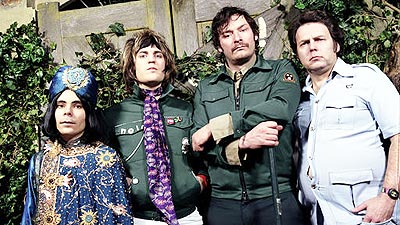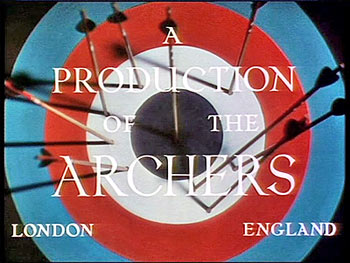Purl Britannia
Published on November 29th, 2009 in: Current Faves, Issues, OMG British R Coming |By Chelsea Spear
For a land-locked American knitter, London seems like a fairyland of the fiber arts. Enterprising crafters hold impromptu knitting circles at pubs, on the Tube, and even at special cinema matinées where theatre owners keep the lights on for them (a practice poo-pooh’d by Alison Goldfrapp in a recent issue of Bust). Waggish knit-bloggers post self-written patterns for unusual objects from slices of cake to hand grenades to (blush) anatomically correct genitalia. While the cost of a round-trip plane ticket to Old Blighty could keep one in cashmere for a year, many of England’s finest yarn manufacturers make their products available to crafty Yanks with an Anglophilic streak.
(more…)
Not M-Miss M-M-Mitford: Brideshead Revisited, Revisited
Published on November 29th, 2009 in: Books, Culture Shock, Issues, OMG British R Coming, TV |By Hanna
When it came out in 1981, the Brideshead Revisited TV series starring Jeremy Irons was an event, and something remembered like a significant date in history by a lot of people who were alive then. Its greater cultural importance lay in the fact that it set the standard for all eccentric and twee undergraduate behavior, eventually becoming a staple for undergrad language students in the UK.
The TV series’ cult status arose from a situation that sounds like an urban legend, because it seems strange that people took it seriously at any point, and even stranger that they would try to copy a lifestyle that is presented as, at best, ambiguous in both the book and the series. But it’s true, and especially in the ’80s and ’90s, students took the TV series as a model for their lifestyles, co-opting with enthusiasm a philosophy of life that would most likely have excluded them from it on the basis of their origins, had it been real.
(more…)
An Introduction To: Reeves and Mortimer
Published on November 29th, 2009 in: Comedy, Culture Shock, Issues, OMG British R Coming, TV |By Aila Slisco
The best kind of laugh is the kind which seemingly comes from nowhere. It’s the product of an inexplicable kind of humor, which no amount of analyzing can explain adequately, and something, which from a comedy performer’s point of view, is just as likely to confuse an audience as it is to make them break down with laughter. Preferably it will do both. This is exactly the kind of comedy the UK comedy duo Reeves and Mortimer have made their specialty.
(more…)
Cosgrove Hall Animation: Danger Mouse And Count Duckula
Published on November 29th, 2009 in: Cartoons, Culture Shock, Issues, OMG British R Coming, TV |By Lisa Anderson
My love for things British goes way back. Like many people my age, I grew up with Nickelodeon, the cable children’s programming network. One of my favorite shows was Danger Mouse, the first British cartoon to break into the American market, and its later spin-off, Count Duckula. Both were from the animation studio Cosgrove Hall.
(more…)
I Love Those Slags: One Fan Explains Her Obsession With The Mighty Boosh
Published on November 29th, 2009 in: Comedy, Culture Shock, Issues, OMG British R Coming, TV |By Noreen Sobczyk
A few years ago I was ill and staying at my parents’ home in the wonderful land of superfluous cable channels. While stirring around under the covers, feverish, I stumbled upon a British program that was surreal and involved an alternate universe and a cab ride with Death himself, but I could find no information regarding the show. It was so wondrous that I thought it may have been a dream.

Character Actor In A Movie Star’s Body: Roger Livesey
Published on November 29th, 2009 in: Culture Shock, Issues, Movies, OMG British R Coming, Retrovirus |By Michelle Patterson
Acting isn’t that hard to figure out; either you keep it simple or you make it seem simple without giving away your hand. While I’m not an actor, I do know that as a woman in day-to-day life, I have to be able to become a different woman to different people. This is something we all do; people can tell when we really believe in what we are saying and when we do not. Life is full of performances, which makes it that much easier to decide who is a good actor and who is not. The act itself is invisible and instead of seeing a character, we see a person.
(more…)
Thank You PBS For Giving Us The BBC
Published on November 29th, 2009 in: Comedy, Culture Shock, Issues, OMG British R Coming, TV |By Noreen Sobczyk
As a child I often tuned into PBS, where shows like Sesame Street, Electric Company, and Zoom taught me my letters and numbers. However, during the evening hours PBS brought me the wonderful world of the BBC where I learned about the decadence and treachery of history through vehicles like I, Claudius and The Six Wives of Henry VIII. There was also the mind-expanding science fiction of Doctor Who. But the most enduring impact was made by British comedies.
(more…)
A Young Person’s Guide To: Powell & Pressburger*
Published on November 29th, 2009 in: Culture Shock, Issues, Movies, OMG British R Coming, Retrovirus |By Chelsea Spear

Who They Are
In the late 1930s, Michael Powell had left banking to study film in the south of France, working his way from lowly production assistant to director of silent films and early talkies. Meanwhile, Emeric Pressburger—a Hungarian émigré—had written screenplays at the legendary Ufa Studio in Germany and in France before settling in London. The pair met as hired hands on Alexander Korda’s 1939 feature Contraband, and spent the following two decades crafting some of the best-loved features to come out of the UK, including The Red Shoes, Black Narcissus, and The Life and Death of Colonel Blimp.
(more…)